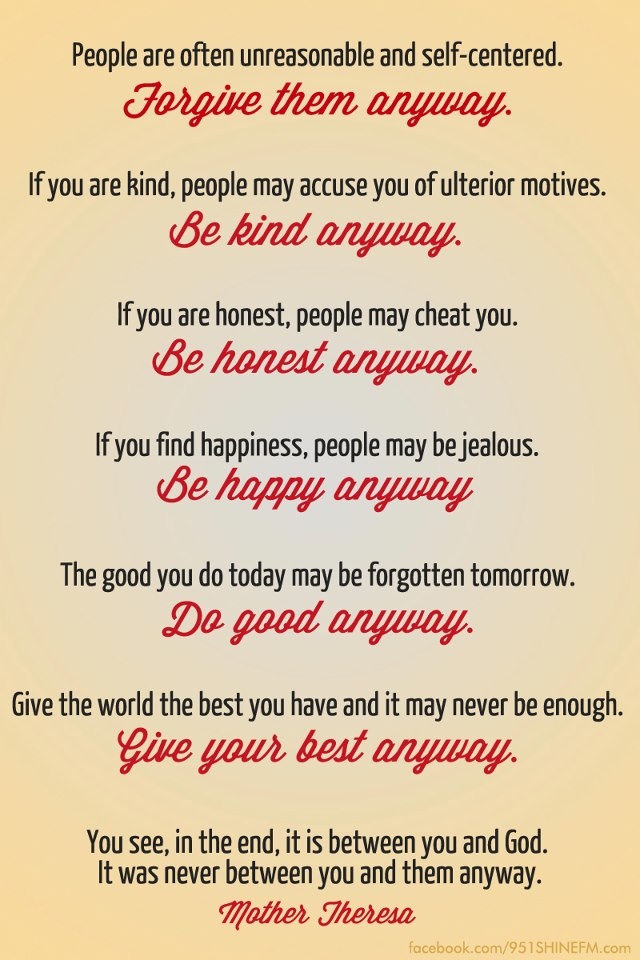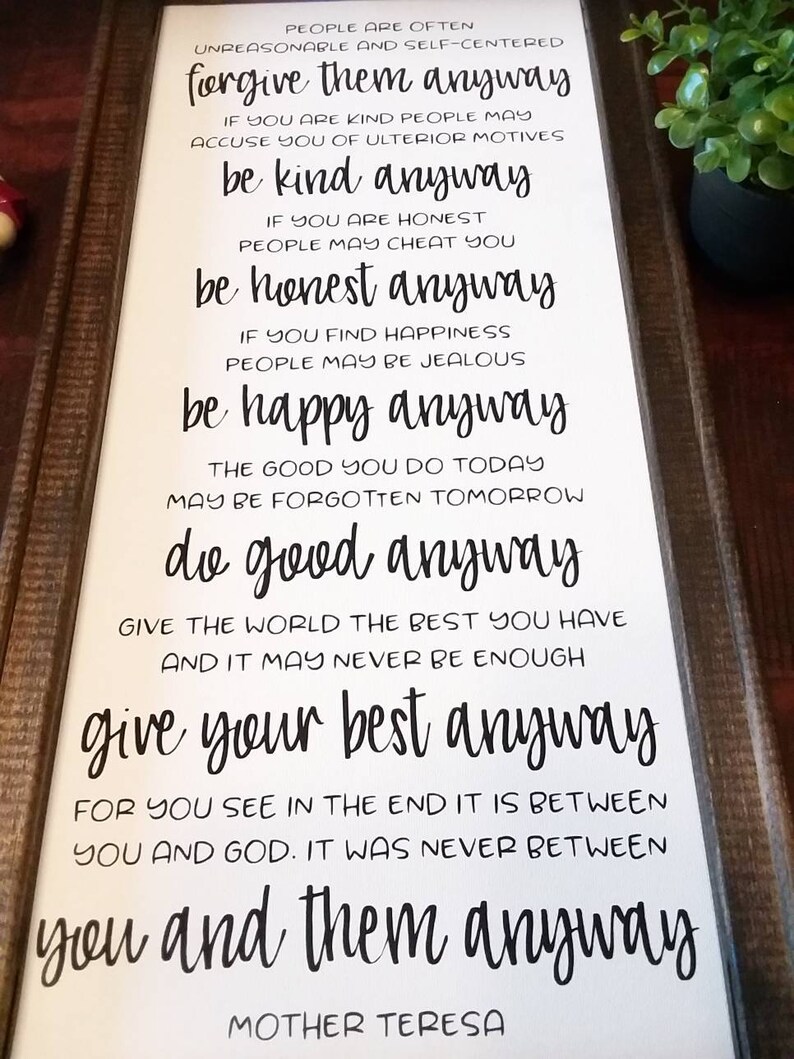So here's the thing, folks. We're diving deep into one of the most profound lessons Mother Teresa ever taught us: forgiveness. It's not just about saying "I forgive you." It's about embracing the act of letting go, even when it feels impossible. Forgiveness isn't just good for the soul—it's good for the heart, mind, and spirit. So buckle up, because this journey is going to be life-changing, trust me.
Mother Teresa didn't just talk about forgiveness; she lived it. In a world where hate and anger often seem like the easiest paths, she chose the road less traveled. Forgiveness, according to her, is not just a moral obligation but a gift we give ourselves. And honestly, who wouldn't want to feel lighter, happier, and more at peace?
Now, let's get real. Forgiveness ain't easy. It takes courage, strength, and sometimes, a whole lot of patience. But hey, that's why we're here—to break it down, share stories, and show you why forgiving anyway is one of the best things you can do for yourself. So grab a cup of coffee, sit back, and let's explore the power of forgiveness through the eyes of Mother Teresa.
Read also:Turtle Rock Park Community Center The Heart Of Community Engagement And Fun
Before we dive deeper, here's a quick table of contents to help you navigate this article. Click on any section to jump straight to it!
- Biography of Mother Teresa
- Why Forgiveness Matters
- Mother Teresa's Famous Forgiveness Quote
- What Does "Forgive Anyway" Mean?
- Benefits of Forgiveness
- Challenges in Forgiving
- Practical Steps to Forgive
- The Impact of Forgiveness
- Forgiveness in Religion
- Conclusion
Biography of Mother Teresa
Alright, let's talk about the woman behind the message. Mother Teresa, born Anjezë Gonxhe Bojaxhiu on August 26, 1910, in Skopje, Macedonia, was a true beacon of hope and love. She dedicated her life to serving the poorest of the poor, and her work has inspired millions around the globe. But before we get into the nitty-gritty of forgiveness, let's take a quick look at her life.
Early Life and Journey
Growing up in a modest family, Mother Teresa felt the call to serve others from an early age. At just 18, she joined the Sisters of Loreto and later moved to India, where she devoted her life to helping the less fortunate. Her mission wasn't just about charity; it was about compassion, empathy, and forgiveness.
Here's a quick glance at her life through a table:
| Fact | Detail |
|---|---|
| Full Name | Anjezë Gonxhe Bojaxhiu |
| Birth Date | August 26, 1910 |
| Place of Birth | Skopje, Macedonia |
| Religious Order | Sisters of Loreto |
| Nobel Prize | 1979 Nobel Peace Prize |
| Canonization | Declared a saint in 2016 |
Why Forgiveness Matters
Forgiveness isn't just some fluffy concept; it's a powerful tool for personal growth and healing. Think about it—how often do we carry around grudges, resentment, or anger? And what does that do to us? It weighs us down, plain and simple.
Mother Teresa knew this all too well. She understood that holding onto bitterness is like drinking poison and expecting the other person to suffer. Forgiveness, on the other hand, sets you free. It's not about excusing bad behavior; it's about releasing the emotional burden that comes with it.
Read also:Mini Banshee For Sale The Ultimate Guide To Owning A Legend
Forgiveness and Mental Health
Research shows that forgiveness can significantly improve mental health. A study published in the Journal of Behavioral Medicine found that people who practice forgiveness experience lower levels of stress, anxiety, and depression. So yeah, forgiving anyway isn't just a spiritual thing—it's a scientific one too!
Mother Teresa's Famous Forgiveness Quote
Now, let's talk about one of her most famous quotes: "Forgive, and you will be forgiven." Simple, right? But don't let the simplicity fool you. This quote carries a world of wisdom. It reminds us that forgiveness is a two-way street. When we forgive others, we create space for healing and reconciliation in our own lives.
But here's the kicker—forgiveness isn't always about the other person. Sometimes, it's about forgiving yourself. And Mother Teresa knew that self-forgiveness is just as important as forgiving others.
What Does "Forgive Anyway" Mean?
Alright, let's break it down. "Forgive anyway" is more than just a phrase—it's a mindset. It means forgiving even when it seems impossible, even when the other person doesn't deserve it, and even when it feels like the hardest thing to do. It's about choosing love over hate, peace over conflict, and understanding over judgment.
Here's why "forgive anyway" matters:
- It breaks the cycle of anger and resentment.
- It promotes inner peace and emotional well-being.
- It allows you to move forward instead of staying stuck in the past.
- It sets an example for others to follow.
Benefits of Forgiveness
Forgiveness isn't just good for the soul; it's good for the body too. Studies have shown that forgiveness can lower blood pressure, reduce stress, and even improve sleep quality. So yeah, forgiving someone isn't just a moral act—it's a health act!
Here are some of the top benefits of forgiveness:
- Improved mental clarity and focus.
- Stronger relationships with family and friends.
- Increased self-esteem and confidence.
- Enhanced overall happiness and life satisfaction.
Challenges in Forgiving
Let's be real for a second—forgiveness isn't always easy. There are times when it feels impossible to let go of hurt, anger, or betrayal. But guess what? That's okay. Forgiveness is a journey, not a destination. It takes time, effort, and sometimes even professional help.
Here are some common challenges people face when trying to forgive:
- Difficulty in letting go of past wounds.
- Fear of being vulnerable or exposed.
- Belief that forgiving means condoning bad behavior.
- Lack of trust in the person being forgiven.
Practical Steps to Forgive
So how do you actually forgive someone? Here are some practical steps to get you started:
Step 1: Acknowledge Your Feelings
Before you can forgive, you need to acknowledge how you feel. Whether it's anger, sadness, or hurt, it's important to recognize and validate those emotions. Suppressing them won't help; in fact, it might make things worse.
Step 2: Reflect on the Situation
Take some time to reflect on what happened. Try to see things from the other person's perspective. This doesn't mean excusing their behavior, but it might help you understand why they acted the way they did.
Step 3: Make a Conscious Decision
Forgiveness is a choice. Once you've reflected on the situation, make a conscious decision to forgive. It might not happen overnight, and that's okay. But the act of choosing to forgive is a powerful first step.
The Impact of Forgiveness
The impact of forgiveness can be life-changing. It can transform relationships, heal wounds, and create a ripple effect of positivity in your life. When you forgive, you open yourself up to new possibilities, new experiences, and new connections.
And let's not forget the impact on your mental health. Forgiveness reduces stress, improves mood, and enhances overall well-being. So yeah, it's kind of a big deal.
Forgiveness in Religion
Forgiveness is a central theme in many religions, including Christianity, where Mother Teresa's teachings are deeply rooted. In Christianity, forgiveness is seen as a divine act—a way of emulating God's love and mercy.
But forgiveness isn't just for religious people. It's a universal concept that transcends faith, culture, and belief systems. Whether you're religious or not, forgiveness is a powerful tool for personal growth and healing.
Conclusion
So there you have it, folks. Forgiveness isn't just a nice idea—it's a necessity. Mother Teresa's message of "forgive anyway" is more relevant today than ever. In a world filled with division, anger, and conflict, forgiveness offers a path to peace, understanding, and healing.
Remember, forgiveness isn't about excusing bad behavior or forgetting what happened. It's about releasing the emotional burden that comes with holding onto anger and resentment. It's about choosing love over hate, peace over conflict, and understanding over judgment.
So what's your next step? Are you ready to forgive anyway? Share your thoughts in the comments below, and don't forget to spread the love by sharing this article with your friends and family. Together, we can make the world a better place—one act of forgiveness at a time. Peace out!


